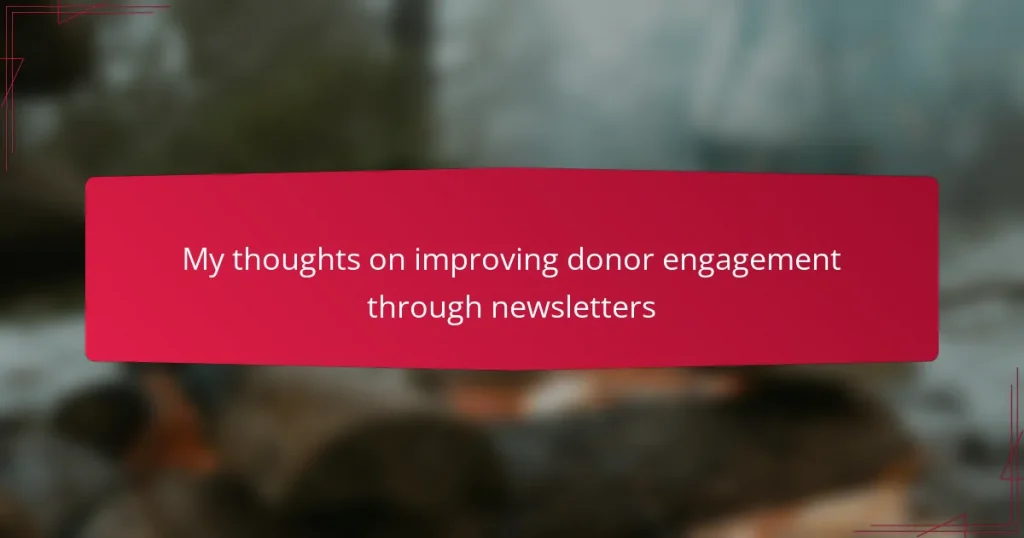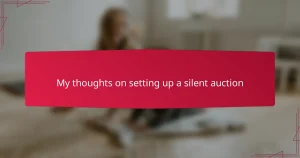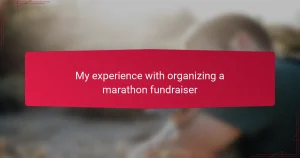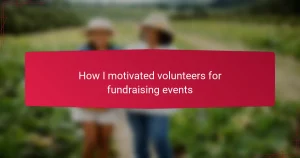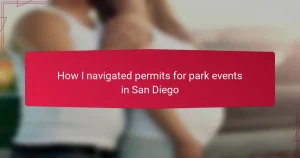Key takeaways
- Engaging donors requires building trust and emotional connections through personalized communication and storytelling.
- Newsletters are essential for ongoing donor engagement, providing regular updates and inviting interaction.
- Tailoring content to local communities enhances emotional connections and improves donor retention.
- Effective strategies to increase newsletter open rates include personalized subject lines and optimizing sending times.

Understanding donor engagement
Understanding donor engagement means recognizing the emotional connection donors feel toward a cause. From my experience, it’s not just about asking for money but building trust and showing appreciation. When donors see the real impact of their support, they become more than just contributors—they become passionate partners.
| Aspect | Engaged Donors |
|---|---|
| Communication | Regular, personalized updates |
| Emotional Connection | Strong sense of belonging and purpose |
| Trust Level | High, due to transparency and impact stories |
| Response | Active participation and feedback |
| Retention | Long-term commitment |

Importance of newsletters for fundraising
Newsletters are a lifeline for ongoing donor engagement in family fundraising efforts here in San Diego. From my experience, they create a consistent touchpoint that personalizes the donor relationship, making supporters feel truly part of the cause rather than just one-time contributors. I’ve seen firsthand how a well-crafted newsletter can reignite passion and commitment by sharing heartfelt stories and clear impact updates.
| Traditional Fundraising Methods | Newsletters |
|---|---|
| Often one-time asks during events or campaigns | Continuous communication that nurtures donor relationships |
| Less personalized, broad messaging | Allows for tailored stories and impact highlights |
| Limited donor feedback opportunity | Invites interaction and feedback through calls to action |

Key elements of effective newsletters
When I think about what truly makes a newsletter effective, personalization jumps out immediately. It’s not just about inserting a name—it’s about speaking directly to what matters to each donor, showing that you see and value their unique role in the journey. Have you ever felt ignored in a crowd? That’s how donors feel when newsletters are generic and distant.
Clear storytelling is another element I find indispensable. I remember one newsletter where we shared a simple story about a family directly helped by our fundraising, and the response was overwhelming. Stories like that build an emotional bridge—donors don’t just read facts; they experience the impact, making the cause feel alive and urgent.
Lastly, I can’t emphasize enough the importance of calls to action. A newsletter should invite donors to engage, not just observe. Whether it’s sharing feedback, attending an event, or simply spreading the word, these prompts create a dynamic relationship. Have you noticed how a small invitation can turn passive readers into active participants? That’s where real engagement begins.

Tailoring newsletters for San Diego families
San Diego families have unique values and interests that deserve special attention in newsletters. From my experience, highlighting local events and community stories resonates more deeply than generic updates. When I tailored content to reflect these local connections, donor engagement noticeably improved.
It’s also essential to recognize the diversity within San Diego families. Some prefer quick, visual content, while others appreciate detailed narratives. Balancing these preferences in newsletters has made the communication feel more personal and effective.
| Approach | Impact on San Diego Families |
|---|---|
| Generic Newsletter | Often ignored due to lack of local relevance and personal touch. |
| Locally Tailored Content | Increases emotional connection by reflecting community values and interests. |
| Balanced Visual & Narrative | Caters to diverse family preferences, enhancing overall engagement and retention. |

Strategies to increase newsletter open rates
One strategy I’ve found effective for increasing newsletter open rates is crafting subject lines that spark curiosity without giving everything away. When I’ve experimented with questions or intriguing statements, donors seem more compelled to click and discover what’s inside. It’s like inviting them into a conversation rather than just sending a routine update.
Another crucial element is timing. Early in my experience, I sent newsletters without considering when people were most likely to check their inboxes. Later, I tested different days and times and noticed a clear difference — sending newsletters mid-morning on weekdays often yielded better open rates. This small adjustment made me realize how much our habits influence engagement.
To boost your newsletter open rates, try these strategies:
– Use personalized subject lines with the recipient’s name or location
– Keep subject lines concise and clear
– Include actionable language or questions to spark interest
– Test sending times and days to identify peak engagement windows
– Segment your donor list based on giving history or interests
– Avoid spammy words that trigger email filters
– Preview your subject line on different devices to ensure readability
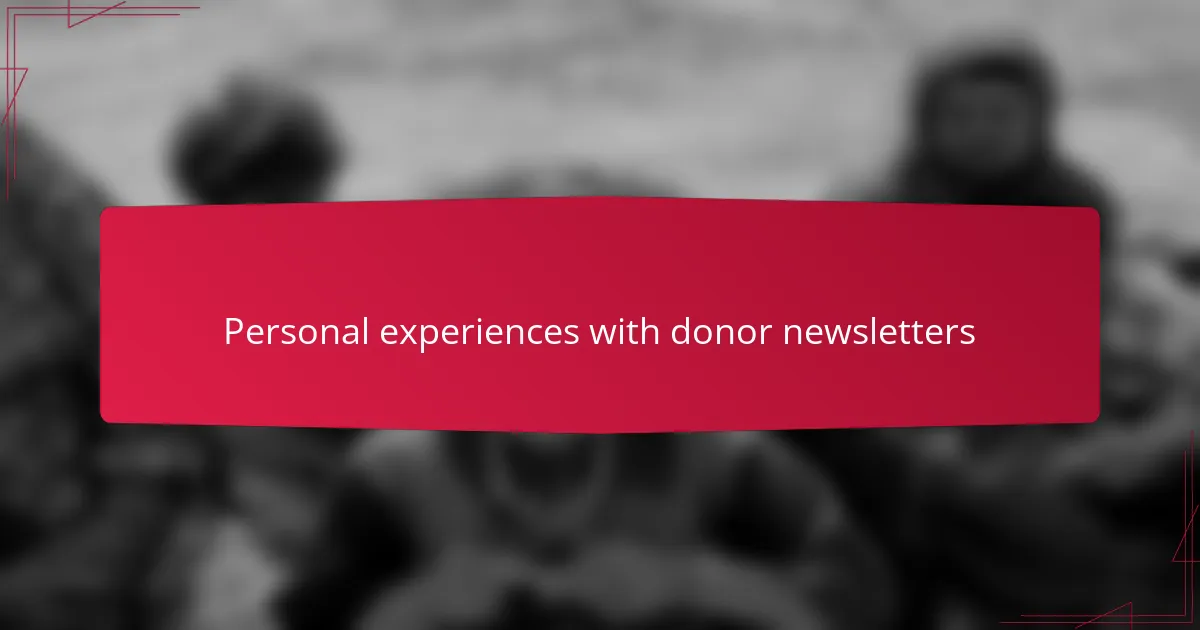
Personal experiences with donor newsletters
Personal experiences with donor newsletters have shown me the real impact of a well-crafted message. I remember a time when a heartfelt story about a family’s progress moved me deeply, making the donation feel truly meaningful. Newsletters that combine personal stories with clear updates not only engage donors but also build lasting trust.
| Aspect | Effect on Donor Engagement |
|---|---|
| Personal Stories | Creates emotional connection and increases empathy. |
| Regular Updates | Keeps donors informed and reassures them their contributions matter. |
| Clear Call to Action | Encourages ongoing support and participation. |
| Visual Content | Makes the newsletter more engaging and memorable. |
| Consistent Schedule | Builds anticipation and strengthens donor relationship over time. |

Tips for sustaining donor relationships through newsletters
Building strong donor relationships through newsletters requires consistency and genuine connection. In my experience working with family fundraising initiatives in San Diego, sending regular updates has helped donors feel personally involved in the cause. When donors see the real impact of their contributions highlighted in heartfelt stories or progress reports, they are more likely to stay engaged over time.
One detail I’ve found critical is making each newsletter feel like a personal letter rather than a generic email. This means addressing donors by name, sharing behind-the-scenes moments, and expressing sincere gratitude. From my perspective, these small touches transform a routine message into an emotional link that keeps donors coming back.
- Personalize each newsletter with the donor’s name and tailored content
- Share stories that highlight the impact of donations on real families
- Include photos or testimonials to create an emotional connection
- Provide clear, transparent updates about fundraising goals and progress
- End with a warm thank-you note that reinforces appreciation and trust
